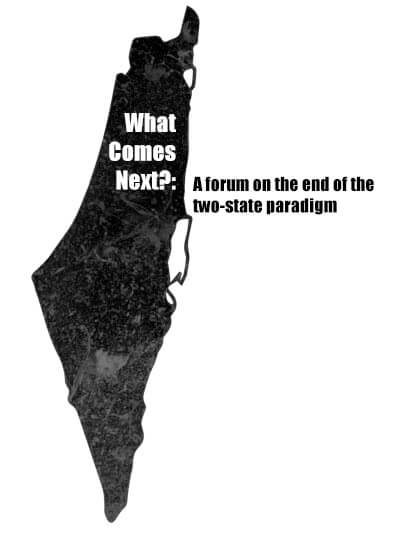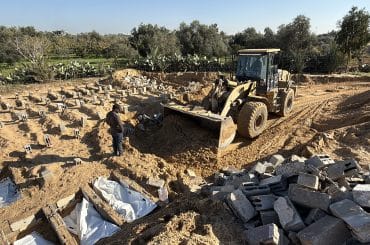This post is part of “What Comes Next?: A forum on the end of the two-state paradigm.” This series was initiated by Jewish Voice for Peace as an investigation into the current state of thinking about one state and two state solutions, and the collection has been further expanded by Mondoweiss to mark 20 years since the Oslo process. The entire series can be found here.
On the ground, in the real world, of course there is no longer any possibility of a real “two-state” solution. Two “real” states would mean that alongside Israel, constituting 78% of historic Palestine, there would be a really independent, actually viable, fully sovereign state of Palestine on the 22% remaining, made up of the Gaza Strip, Arab East Jerusalem, and the entire West Bank. The claimed permanence and continued expansion of city-sized, Jews-only settlements across East Jerusalem and the West Bank populated by over 600,000 people, the Separation Wall seizing 10% or so of West Bank land and most of its key water sources for Israel and not Palestine, and the unchallenged Israeli determination that any future Palestinian “state” would have no control over its borders, airspace, coastal waters and would be kept forcibly disarmed by outside actors… all make a mockery of “two states.” While the creation of a Palestinian “state,” made up of a bunch of scattered non-contiguous cantons amounting to less than half of the 22% of historic Palestine, is certainly possible, the notion that it would amount to an independent, sovereign, real state is specious; the idea exists today only as a diplomatic fiction.
 All of historic Palestine – Israel, the West Bank, Gaza, and East Jerusalem – are currently under the control of one government and one army – Israel’s. (The “Palestinian Authority’s” authority is limited to essentially municipal power.) But the peoples of that land live under very different legal regimes, with different levels of rights, privileges and discrimination facing Jewish citizens of Israel, Palestinian citizens of Israel, Palestinian residents of East Jerusalem, Jewish settlers in the West Bank, and Palestinians living under military occupation in the West Bank and Gaza, as well as Palestinian refugees denied their international right to return to their homes. Today, those separate legal systems, designed to privilege one group – Jews – at the expense of another group – non-Jews, which means Palestinians – stands in violation of the International Covenant for the Prevention and Suppression of the Crime of Apartheid.
All of historic Palestine – Israel, the West Bank, Gaza, and East Jerusalem – are currently under the control of one government and one army – Israel’s. (The “Palestinian Authority’s” authority is limited to essentially municipal power.) But the peoples of that land live under very different legal regimes, with different levels of rights, privileges and discrimination facing Jewish citizens of Israel, Palestinian citizens of Israel, Palestinian residents of East Jerusalem, Jewish settlers in the West Bank, and Palestinians living under military occupation in the West Bank and Gaza, as well as Palestinian refugees denied their international right to return to their homes. Today, those separate legal systems, designed to privilege one group – Jews – at the expense of another group – non-Jews, which means Palestinians – stands in violation of the International Covenant for the Prevention and Suppression of the Crime of Apartheid.
Ultimately, the nature of the political solution – one state or two states, secular or bi-national, regionally federated or isolated – is up to the people who live there. A civil rights or anti-apartheid struggle for equality could in theory emerge in either a one or two-state context. (With two states, there would need to be complete equality between the two states as well as within both states.) But for those of us in the U.S. who are not either Palestinians or Israelis, that’s not our call.
For us, the issue should focus on rights, not on political arrangements which are ultimately not our business. Our goal should be to change the policies of our government, whose military aid and unlimited political and diplomatic protection enable Israel’s policies and sustain its power. We should focus on ending the U.S. policy of support for occupation and apartheid, in favor of a policy based on international law, human rights, and equality for all.


Posted on MW, Oct. 18, 2013
I love this quote
“Ultimately, the nature of the political solution – one state or two states, secular or bi-national, regionally federated or isolated – is up to the people who live there. A civil rights or anti-apartheid struggle for equality could in theory emerge in either a one or two-state context. ”
Had we been left alone we would have found a solutions long time ago.
And another remark – unlike the end of the occupation none of the relevant governments (EU, US, other western countries, Turkey, India, China, Australia, South America, Russia) seem to support the right of return to pre 67 borders. For the simple reason that this would immediately cause a dangerous precedent allowing many groups of their own populations exiled in the recent and not so recent past to demand similar rights. Germans, Greeks, Crimean Tatars, etc, etc
“Ultimately, the nature of the political solution – one state or two states, secular or bi-national, regionally federated or isolated – is up to the people who live there.”
Really? Was the nature of the political solution to Nazism (and Japanese Military Imperialism) left to be determind by the people who lived there? NO.
NO. The answer to Fascism, Dictatorship, Imperialism, Colonialism, is never arrived at by leaving it in the hands of the unequal people. It requires outside intervention. Of course, it doesn’t always GET outside intervention. The USA, for instance, fought Hitler because of his attacks and take-overs of most of Europe, not because of the rather minor (by comparison, as things were seen then, and as they’d be seen now) of the Holocaust. And the nations have not bothered themselves about Palestine. EITHER.
But the repair of post-Holocaust Germany was not a “deal” cooked up between Germans and Jews.
And Bennis recognizes this: “Our goal should be to change the policies of our government, whose military aid and unlimited political and diplomatic protection enable Israel’s policies and sustain its power.” As she says, OUR (USA’s) political situation is for us to determine, not (necessarily) Israel’s.
Phyllis Bennis laments that a two state solution is no longer possible because of the Israeli governments settlement polices, of course any other preferred solution would on that basis be a priori similar since they have it [or so it would seem] in their power to wreck any solution not to their liking. So we must come back to first principles, if the settlements are illegal, I say if because although the UNSC have said they are in various Resolutions, and the ICJ has given an opinion on them in it’s 2004 Wall case, there they said that the settlements breach article 49.6 of the Geneva Conventions, but because it was just an opinion it had no enforcement power other than to tell other Nations that they should use the powers and responsibilities they had to “see to it” that these Conventions were upheld. The UNSC have shown themselves unwilling to enforce its own Resolutions, in which case it is meaningless to describe an action [the settlement enterprise]as illegal if there is no expectation that the perpetrators of the action will be convicted by a competent judicial body, in the real world an action is legal unless a competent judicial body rules that it is illegal and then enforces it. This does not mean it is the end of the matter, the prosecution of the Israeli individuals responsible for the ongoing settlement enterprise can be accomplished at the International Criminal Court whose articles describe the settlement enterprise as war crimes, and it is possible for serving members of the Israeli Government including the Prime Minister to be indicted, the reason they have not been up til now has been because of Israel/US threats of retribution, sooner or later the Palestinian leadership must pressure the ICC to investigate this monstrous crime, it is only after the courts findings and other states reaction to it that other exotic political formulations should be considered.
The Two-State Solution died at Gush Katif.
Israel could barely remove a few thousand settlers from Gaza without a national crisis. At that point the game was over.
They had major rallies against the departure from Gush Katif
http://www.haaretz.com/print-edition/news/60-000-protest-pullout-plan-in-gush-katif-1.120880
At least nine Palestinians were killed in retaliation.
And this was just over a small community near Rafah.
The Israelis will never withdraw again.
The only option left for the Palestinians is emigration or a demand for the vote.
“For us, the issue should focus on rights, not on political arrangements which are ultimately not our business.”
I agree completely. In the short term, the focus needs to be on the safety and security of the Palestinians in Israel/Palestine. End the blockade of Gaza, protect the West Bank Palestinians from the illegal settler-terrorists, safeguard the land and trees and crops, etc. Not an easy task, but preferable to never-ending discussions or “negotiations” over one state versus two states. Ending human rights violations should resonate with most, and is tough to argue against.